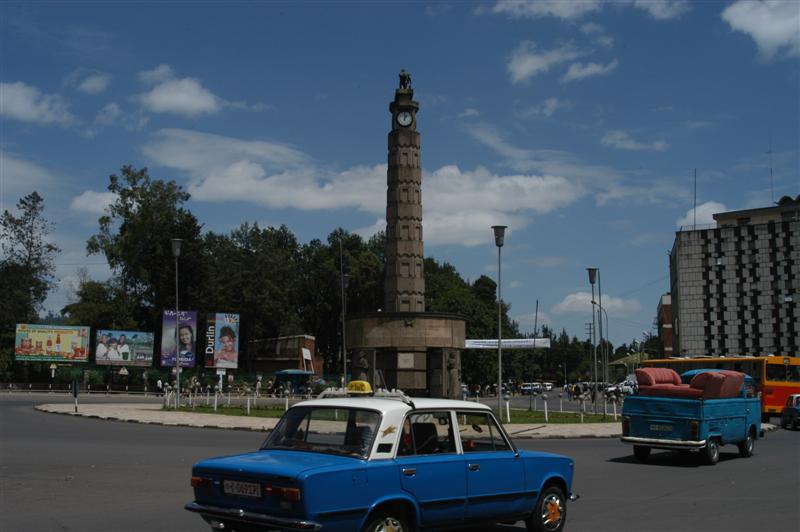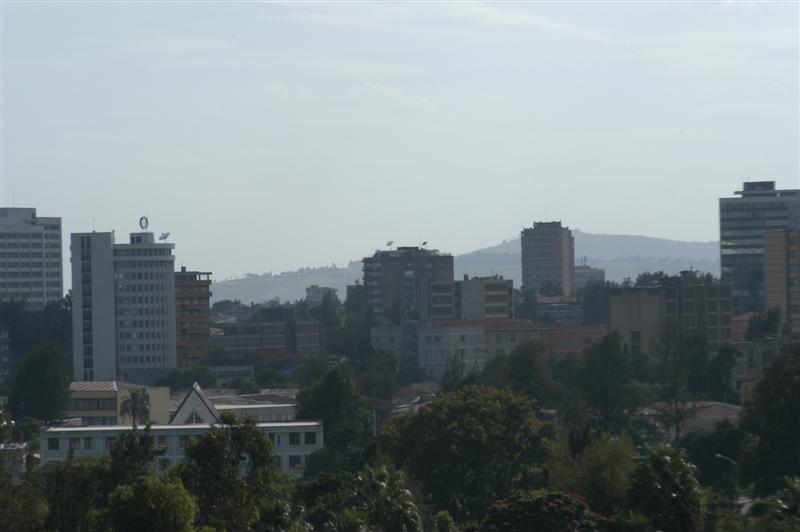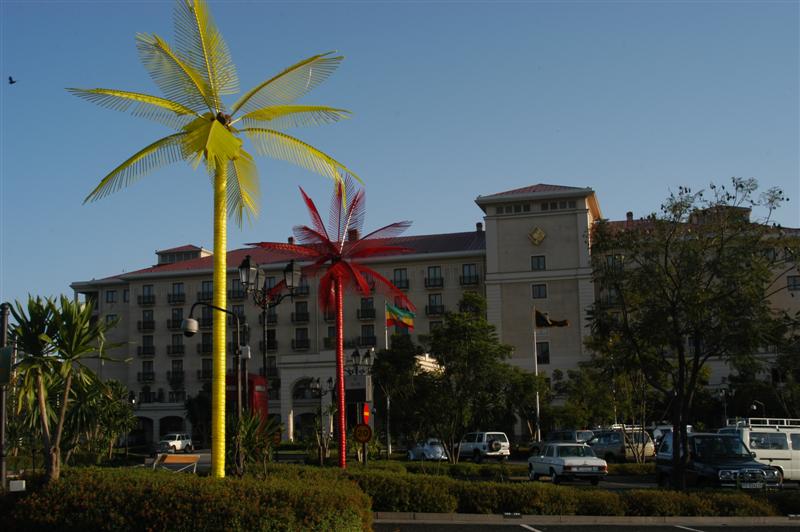October 28 - October 29. ADDIS ABABA The weather was beautiful on our second day in Addis so we decided to try walking a bit. Rob wasn't as keen on the idea but I was dying for some exercise. The map in our book didn't give enough detail so we just mad e a guess as to how to get to the National Museum and started off in that direction. Our route took us through the smaller streets behind our hotel. They wove across the hills, up and down, past modest homes and smiling faces. Every once in a while we had a beggar but I genuinely felt pretty safe. Rob was more cautious. I was carrying my camera so we didn't really stop to interact with people, just returning their smiles and greetings and moving along. After about twenty minutes it became clear that we didn't know where exactly we were and had no ides how much father we had to walk to reach the museum. When our back road converged on a larger road we hailed a taxi to take us the rest of the way, which was actually farther than we thought. The new road went up and over another hill before we joined one of Addis' main thoroughfares, Entoto Road, where the National Museum was located. e a guess as to how to get to the National Museum and started off in that direction. Our route took us through the smaller streets behind our hotel. They wove across the hills, up and down, past modest homes and smiling faces. Every once in a while we had a beggar but I genuinely felt pretty safe. Rob was more cautious. I was carrying my camera so we didn't really stop to interact with people, just returning their smiles and greetings and moving along. After about twenty minutes it became clear that we didn't know where exactly we were and had no ides how much father we had to walk to reach the museum. When our back road converged on a larger road we hailed a taxi to take us the rest of the way, which was actually farther than we thought. The new road went up and over another hill before we joined one of Addis' main thoroughfares, Entoto Road, where the National Museum was located.
The museum was housed in a small and rather run down building, hardly an indication of what was hidden inside. We were greeted at the gate by two security guards who gave our bags a look through before letting us inside. The National Museum was also home to the Department of Inventory and Inspection where souvenirs had to be inspected before leaving Ethiopia. We checked the hours for future reference before continuing inside the main entrance. The exhibits started in the basement with a well laid out display on pre-historic times that led to the main reason we had visited the museum at all, Lucy, the 3.2 million year old skeleton of a hominid from the Australopithecus afarensis group. When she was discovered in 1974 she was the oldest and most complete hominid skeleton in the world. Her erect posture and small brain contradicted previous theories that our ancestors didn't begin to walk until their brains had gotten bigger. At just over a meter high, Lucy would have weighed just 30kg (66.3 lbs). The bones we saw neatly laid out in the display case weren't her real bones, which were kept in the museum archives, but the modest exhibit was still a bit of a thrill. In Ethiopian Amharic Lucy is called Denkenesh or Birkinesh, meaning 'You are Wonderful' but her more common name was derived from a song that was playing at the archeologists' camp when she was discovered, Lucy in the Sky with Diamonds.
Often referred to as a "cradle of civilization", Ethiopia has a very rich and unique history. We were looking forward to visiting the country's renowned historical sites of Bahar Dar, Gonder, Lalibela, Axum, and Mekele to learn more. Most of our sub-Saharan experience had been devoted to Africa's outstanding geography, stunning wildlife and the colorful tribal cultures but we were ready for something different. Ethiopia also had wildlife, scenery and traditional cultures but our focus would be on the fascinating history that differentiates Ethiopia from the rest of East Africa.
The rest of the museum was a good way to start gaining a better understanding of the country's history. In just four compact floors it covered everything from pre-historic artifacts, traditional clothing, royal tidbits, religious icon paintings, and various arts and crafts. The Ethiopian icon paintings were brightly detailed images from the bible and were the closest in style to traditional Buddhist thangkas of any artwork that I have seen. I couldn't imagine any direct relationship between the two art forms but couldn't help but note the similarly bold colors and vivid details. We went through the museum at a leisurely pace and then stopped for a drink at the museum's tukul, a traditional thatched hut in front of the museum that was used as a cafe. through the museum at a leisurely pace and then stopped for a drink at the museum's tukul, a traditional thatched hut in front of the museum that was used as a cafe.
From the museum we set off on foot to explore more of Addis. This was an entirely different area than we had been in the day before. Heading down Entoto Road we encountered a large traffic circle. The cars whipping around it in all directions seemed totally un-phased by the large herd of sheep that was being carefully led across the chaotic intersection. We continued walking, stopping for some toiletries and then ducking into an internet cafe. Now that Meskel was over the streets were busier. The sad sight of begging was still frequent but seemed less overwhelming than in the empty streets of the day before. Most people didn't take much notice of us but we saw few, if any, other tourists. We stopped at the post office to mail some postcards. Outside the post office we were confronted by three young boys wearing tattered green sweaters, their school uniform. They walked up to us, shook Rob's hand and introduced themselves but what they really wanted was was to sell us tissues or, better yet, just give them one birr. They ended up following us down the street, peeking around corners and into a shop before returning to their spot in front of the post office.
We went into a bank to change money but I couldn't get past the guards with my camera. I would have to leave it with them if I wanted to go any further. It may have been fine but I didn't want to risk it so Rob went in on his own while I waited. The guards were friendly and chatted with me a bit. One stood inside while another patrol outside with the machine gun. The way they casually passed the gun from one to another when they changed posts made be a bit uneasy. They had offered me a seat in the chair they had next to the door and the gun swung directly at me as they dropped it from one man's shoulder and positioned it on the other man's. It seemed more like a shoulder bag than a machine gun. I had to wait longer than expected while Rob sorted out the money. He ended up having a problem with the bank. After filling out the exchange form he was told to sign that he had received the money even though he hadn't. That was their process, or lack thereof. The next window actually counted out the money but they made a mistake and short changed him. When he confronted them with it he was told "But you signed the form!". He had to patiently explain that he was told to sign th e form at one window and the money was counted as another. That was, after all, their process. It was straightened out in the end. e form at one window and the money was counted as another. That was, after all, their process. It was straightened out in the end.
With our errands finished we returned to our hotel and had dinner at the restaurant upstairs.
On Wednesday I wasn't feeling well so Rob went out to explore a bit on his own. He ventured into a different part of the city, down through the Piazza and along Churchill Road. There was a lot of souvenir shopping in these areas so he checked out the shops. He also visited the old St. George Cathedral, just before the Piazza. When he returned I was feeling better so we went out together to visit the Telecom office at the end of Churchill Road. Our travel insurance was expiring so we needed to call and extend it. Rob had figured out the minivan service that passed in front of our hotel so instead of paying for a 20 birr cab ride we spent four birr to reach the end of Churchill Road. We grabbed one minivan in front of our hotel and changed at the piazza. The whole process didn't take long and was worth the savings. After several attempts at the telecoms office we were unable to make an 800# call out of Ethiopia. They just told us that it was a toll free number that didn't work in Ethiopia. We tried to explain that it is only toll-free in the US but it is treated like a regular call when made from overseas. It was a battle and both the woman at the counter and the operator were incredibly rude. A man standing nearby tried to intervene and help us but it was no use. It was impossible to make a 800# call to the US from Ethiopia at this telecom office. We would have to sort it out in Bahar Dar. |
ADDIS ABABA
Oct 26
Oct 27
Oct 28-29
BAHAR DAR
Sept 30
Oct 1
Oct 2
Oct 2-3
GONDER
Oct 4
LALIBELA Oct 5
Oct 6
AKSUM
Oct 7
Oct 8
Oct 9
ADDIS ABABA
Oct 10-14
|

